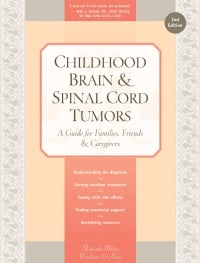Childhood Brain and Spinal Cord Tumors
Protocol changes
Many parents express anguish when their child’s doses or schedules for chemotherapy change during treatment. It is very common for doses to be lowered or treatment to be delayed while a child recovers from low blood counts, infection, or toxic reactions to the treatment. In fact, almost every child has dose reduction(s) or delays in treatment. The protocol is a guideline that will be modified, depending on your child’s response to treatment.
I didn’t know what a protocol was when my son was diagnosed, and I understood from the doctors that this was the “exact” regime that must be followed to cure him. It frightened me whenever changes were made in the protocol. With time, I came to view the protocol as merely a guideline that is individualized for each patient according to his tolerance and reaction to the drugs. We ended up deleting whole sections of the protocol due to extreme side effects. He has been off therapy for 15 years now and is doing great.

When we were struggling with the decision of whether to join the study, I asked the oncologist how would we ever know if we made the right decision. He said something very wise. “You will never know and you should never second guess yourself, no matter how the study turns out. Statistics are about large groups of kids, not your child. Your child might respond no matter which arm she is on or she might show no benefit from a treatment arm where most other kids do well. Statistics for you will be either 100 percent or 0 because your child will either live or die. I can’t tell you which will be the better treatment, that is why we are conducting the study. But no matter what, we will be doing absolutely the best we can.”
Table of Contents
All Guides- Introduction
- 1. Diagnosis
- 2. The Brain and Spinal Cord
- 3. Types of Tumors
- 4. Telling Your Child and Others
- 5. Choosing a Treatment
- 6. Coping with Procedures
- 7. Forming a Partnership with the Treatment Team
- 8. Hospitalization
- 9. Venous Catheters
- 10. Surgery
- 11. Chemotherapy
- 12. Common Side Effects of Chemotherapy
- 13. Radiation Therapy
- 14. Peripheral Blood Stem Cell Transplantation
- 15. Siblings
- 16. Family and Friends
- 17. Communication and Behavior
- 18. School
- 19. Sources of Support
- 20. Nutrition
- 21. Medical and Financial Record-keeping
- 22. End of Treatment and Beyond
- 23. Recurrence
- 24. Death and Bereavement
- 25. Looking Forward
- Appendix A. Blood Tests and What They Mean
- Appendix C. Books and Websites

